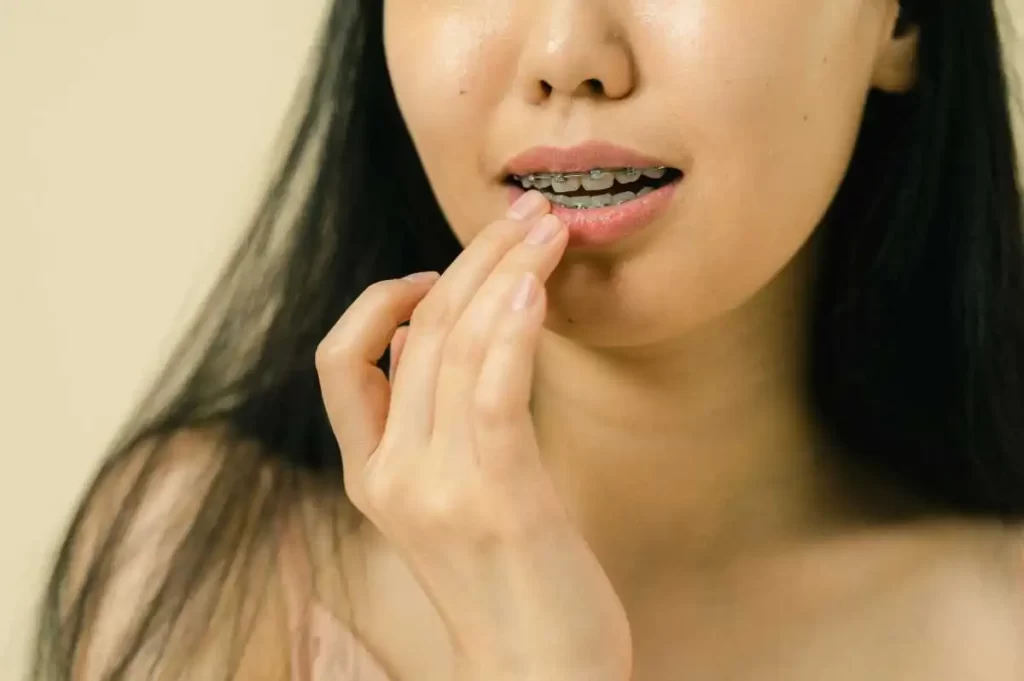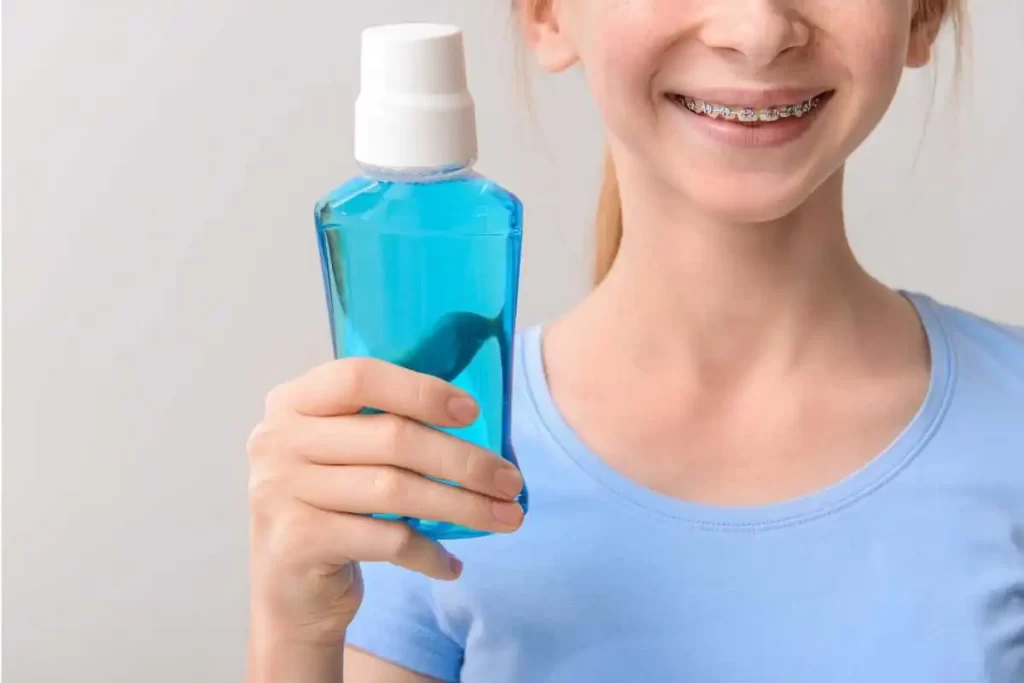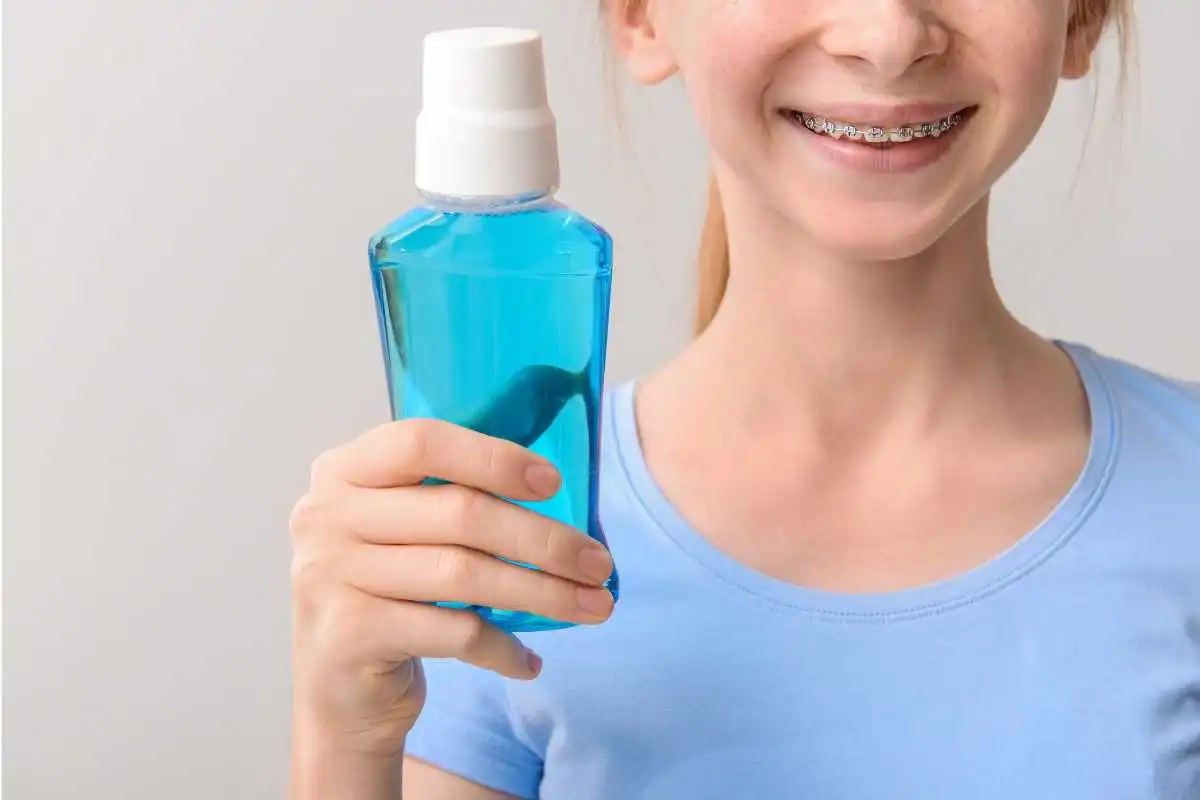Oral hygiene is crucial for maintaining a healthy smile, especially when undergoing orthodontic treatment with braces.
One common question that arises is whether it’s safe to use mouthwash with braces.
In this guide, we will delve into the intricacies of oral care for individuals with braces, addressing concerns about using mouthwash, and providing valuable insights to help you maintain optimal oral health during your orthodontic journey.
Table of Contents
Importance of Oral Hygiene with Braces:

Oral hygiene takes on heightened significance when braces become part of the equation.
The intricate design of braces, comprising brackets, wires, bands, and ligatures, creates an environment where food particles easily accumulate.
These nooks and crannies provide a breeding ground for bacteria, leading to plaque buildup and potential oral health issues.
The brackets, attached to each tooth, act as anchors for the orthodontic wires. It’s crucial to recognize that these brackets can accumulate plaque and food particles around their edges.
Similarly, the wires, connecting the brackets, apply pressure to shift the teeth into the desired position.
However, they also become a magnet for food particles, contributing to the challenge of maintaining optimal oral hygiene.
Bands and ligatures, responsible for securing the wires to the brackets, add another layer of complexity.
These components can trap debris, making it imperative to adopt a diligent oral care routine to address the vulnerabilities associated with braces.
With these factors in mind, it becomes clear that a proactive approach to oral hygiene is essential during orthodontic treatment.
Failure to maintain a stringent routine can lead to complications such as cavities, gum disease, and other oral health issues.
Therefore, understanding the importance of oral hygiene with braces is the first step towards ensuring a healthy and confident smile throughout your orthodontic journey.
Read: Can Braces Make Your Teeth Fall Out? (7 Reasons).
The Components of Braces and Their Vulnerabilities:
Before exploring the compatibility of mouthwash with braces, it’s essential to understand the components of braces and their vulnerabilities.
- Brackets:
- Brackets are attached to each tooth and act as anchors for the orthodontic wires.
- They can accumulate plaque and food particles around their edges.
- Wires:
- The wires connect the brackets and apply pressure to shift the teeth into the desired position.
- Food particles easily adhere to the wires, leading to plaque buildup.
- Bands and Ligatures:
- Bands and ligatures secure the wires to the brackets.
- They can trap debris and contribute to oral hygiene challenges.
Read: 10 Best Orthodontic Wax for Braces.
The Challenges of Cleaning Braces:
As we delve into the complexities of maintaining oral hygiene with braces, it becomes evident that traditional cleaning methods may fall short in addressing the unique challenges posed by this orthodontic appliance.
The intricacies of braces, including brackets, wires, bands, and ligatures, create an environment where thorough cleaning is not always straightforward.
The challenges of cleaning braces arise from the following factors:
- Nooks and Crannies:
- The brackets, attached to each tooth, create additional surfaces where plaque and food particles can hide. Cleaning around these small and often hard-to-reach areas requires a focused and meticulous approach.
- Orthodontic Wires:
- The wires connecting the brackets provide the necessary pressure to shift teeth into alignment. However, they also act as a trap for food particles, making it challenging to maintain cleanliness along the entire length of the wire.
- Bands and Ligatures:
- Bands and ligatures secure the wires to the brackets, forming yet another set of components that can accumulate debris. Cleaning around these areas necessitates attention to detail to prevent plaque buildup.
Given these challenges, it is evident that a standard toothbrush and dental floss may not be sufficient in ensuring a thorough cleaning of braces.
Specialized tools, such as interdental brushes, floss threaders, or water flossers, can be valuable additions to your oral care arsenal.
Understanding and overcoming the challenges of cleaning braces are crucial for preventing oral health issues such as cavities and gum disease. Incorporating these insights into your daily oral care routine will contribute to maintaining a healthy and radiant smile throughout your orthodontic treatment.
Can You Use Mouthwash with Braces?
The question of whether mouthwash is suitable for individuals with braces is a common concern, and the answer is a definite yes. In fact, using mouthwash as part of your oral care routine with braces can offer several benefits to enhance your overall dental health.

1. Antibacterial Properties:
Many mouthwashes on the market contain antibacterial agents, such as chlorhexidine or cetylpyridinium chloride.
These ingredients are particularly advantageous for individuals with braces as they help reduce the buildup of bacteria and plaque around the brackets and wires.
By incorporating an antibacterial mouthwash into your routine, you contribute to the prevention of gum disease and promote a healthier oral environment.
2. Fluoride Content:
Braces make it challenging to clean certain areas thoroughly, increasing the risk of cavities.
Using a mouthwash with fluoride can be beneficial, as fluoride helps strengthen tooth enamel and plays a crucial role in preventing tooth decay.
This is especially important for individuals with braces, as their teeth are more susceptible to demineralization.
3. Fresh Breath:
Braces can create additional spaces for food particles to get trapped, leading to potential bad breath.
Mouthwash provides a refreshing solution by eliminating odor-causing bacteria and leaving your breath minty fresh.
This is particularly helpful for individuals with braces who may find it challenging to clean hard-to-reach areas with traditional oral care methods.
4. Alcohol-Free Options:
While some mouthwashes contain alcohol, it’s advisable to opt for alcohol-free alternatives, especially for individuals with braces.
Alcohol-free mouthwashes are gentler on oral tissues, reducing the risk of irritation and dryness.
This is important for individuals with braces who may already experience some discomfort during their orthodontic treatment.
5. Enhanced Cleaning in Hard-to-Reach Areas:
Mouthwash can reach areas that may be challenging to access with a toothbrush or floss alone.
Swishing mouthwash around your mouth ensures that it reaches all surfaces of your teeth, including those hidden behind brackets and wires, providing a more comprehensive clean.
Incorporating mouthwash into your daily oral care routine with braces is a proactive step towards maintaining optimal dental health. However, it’s essential to choose the right type of mouthwash and follow a structured oral care routine that includes brushing, flossing, and regular dental checkups.
Remember to consult with your orthodontist for personalized recommendations based on your specific needs and the type of braces you have. With the right approach, using mouthwash can be a valuable addition to your oral care toolkit, contributing to a healthy and radiant smile throughout your orthodontic journey.
Choosing the Right Mouthwash for Braces:
Not all mouthwashes are created equal, and some may be more suitable for individuals with braces than others. Consider the following factors when selecting a mouthwash:
- Alcohol-Free Options:
- Mouthwashes without alcohol are gentler on oral tissues, reducing the risk of irritation and dryness.
- Fluoride Content:
- Opt for a mouthwash with fluoride to enhance your cavity prevention efforts.
- Antibacterial Properties:
- Look for mouthwashes that specifically mention antibacterial properties, as these can aid in controlling plaque and bacteria.
Incorporating Mouthwash into Your Oral Care Routine:
Now that we’ve established the compatibility of mouthwash with braces, let’s discuss how to incorporate it effectively into your daily oral care routine.
- Brushing:
- Begin by brushing your teeth thoroughly with a soft-bristle toothbrush. Pay special attention to the areas around brackets, wires, and other components of your braces.
- Flossing:
- Use orthodontic-friendly floss or a floss threader to clean between your teeth and around the braces. This step is crucial for removing trapped food particles.
- Rinsing with Water:
- Rinse your mouth with water to clear away any loose debris before using mouthwash.
- Applying Mouthwash:
- Measure the recommended amount of mouthwash as per the product instructions.
- Swish the mouthwash around your mouth for the specified duration, ensuring it reaches all areas of your braces and teeth.
- Spit, Don’t Rinse:
- Spit out the mouthwash without rinsing your mouth with water immediately afterward. This allows the active ingredients to continue their work.
Frequency of Mouthwash Use:
The frequency of mouthwash use can vary based on individual needs and preferences.
However, incorporating mouthwash into your oral care routine at least once a day, preferably before bedtime, can significantly contribute to maintaining a clean and healthy mouth.
Additional Tips for Oral Care with Braces:

- Regular Dental Checkups:
- Schedule regular dental checkups with your orthodontist for professional cleanings and adjustments.
- Orthodontic Wax:
- Keep orthodontic wax on hand to address any sharp edges or discomfort caused by braces.
- Proper Nutrition:
- Maintain a balanced diet and avoid sticky or hard foods that can damage braces.
- Stay Hydrated:
- Drink plenty of water to help flush out food particles and maintain saliva production, which aids in oral health.
Conclusion
Using mouthwash with braces is not only safe but also highly beneficial for maintaining optimal oral health.
By understanding the vulnerabilities of braces and choosing the right mouthwash, you can enhance your oral care routine and enjoy a healthy, beautiful smile throughout your orthodontic journey.
Remember to consult with your orthodontist for personalized advice on oral care with braces, and stay committed to a comprehensive routine for the best results.

